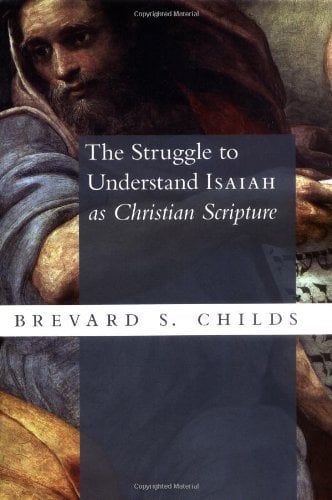The final chapter of Child’s review attends to the phenomenon known as post-modern interpretation of the Bible. He focuses on providing a critique of W. Brueggemann, sometimes a very strong critique— “to confuse the divine Spirit with human imaginative creativity is to introduce a serious distortion into the entire theological discipline”.
There are so many problems with Brueggemann’s whole approach to the Bible, that we can only list a few here that Childs mentions or alludes to:1) there is an enormously faulty theory of meaning, coupled with an equally faulty theory of how we know what we know. It couples bad epistemology with equally bad theories of meaning. Contra these theories, there are meanings in texts which can be known with some measure of objectivity. Human capacity to know and understand reality outside one’s own psyche at least to a significant degree is the foundation of all knowledge of any sort, and particularly of all the modern sciences. Meaning is not merely in the mind of the beholder, and studying the Bible is not like staring at an inkblot and projecting into it images that come to mind. Even if one doesn’t believe in a theory of divine revelation in regard to the Bible, there is still the matter of having respect for the literary products of other people, and allowing them to have their say. I do not get to tell Isaiah what his text means, and if I read my own meanings into the text that are at variance with the claims the text is making, that is not good interpretation, it’s a distortion of the meaning of the text. 2) it is not true that ‘all we have is texts’. When it comes to the Bible we also have artifacts, architecture, art in the form of drawings, mosaic etc. and I could go on. 3) the defective theory of language assumed by post-modernists is especially problematic. Language more often than not does speak of extra-textual realities, and often, though not always, it speaks truthfully about those realities. When it comes to the Bible, those realities even include God. 4) the assumption of radical subjectivity and that all construals of history are just ideological fiction constructed on the basis of present interests is even more problematic. Obviously, people have points of views, and one must take one’s own point of view into account when evaluating one’s own or another person’s work. One must take into account one’s concerns, tendencies, social location, even biases. But critical thinking even about oneself is humanly possible, and it is simply not the case that one is necessarily construing the Biblical text on the basis of some present concern or driving interest. This is especially clear when you find a commentator wrestling with a Biblical idea that he or she finds offensive, but nonetheless agrees that that is what the Biblical text is saying and meaning. 5) In the case of Brueggemann, and his Isaiah commentary, as Childs points out, we have the classic example of a person who is trying too hard to avoid Christian readings of the book, even to the extreme of suggesting that the NT writers were all wrong in saying that the book predicts Christ and his ministry. In his view it doesn’t even anticipate Christ, and as Childs says, he is even nervous when talking about messianism in the text of Isaiah or an over-arching Heilsgeschichte or Biblical story; 6) while one can agree that no interpreter can claim he has exhausted the meaning of the text and has given a once for all final interpretation of its meaning, it does not follow from this fact that one cannot get at a definite and stable meaning of the text that is at least part of the truth about what it claims, a meaning which a wide range of interpreters can agree is part of the text. 7) The constant failure of the post-modern approach to reckon with the possibility that God can break through our cloud of unknowing and actually reveal some truths to us, a truth that makes a definitive claim on us, and conveys some truth content to us is frankly dismaying. 8) the Bible is not an endless stock of imagery constantly waiting for us to make a creative use of it. It makes all sorts of claims on us, not the least of which is that we need to change our ideas, our beliefs and our behaviors to conform to God’s will as revealed in the Bible. 8) At the end of the day post-modernism undermines the very concept of an inspired Bible and of Biblical theology based on the ideas in both testaments, and the very idea that the NT writers were right in seeing Christ as the fulfillment of all sorts of things promised and predicted in the OT. Jewish-Christian dialogue is not furthered by these sorts of denials and negations, nor is the Jewish interpretation of their own Hebrew Bible in any way threatened by the Christian study of the book. Indeed, we often help each other to better understand what God and the Jewish authors were actually saying.













